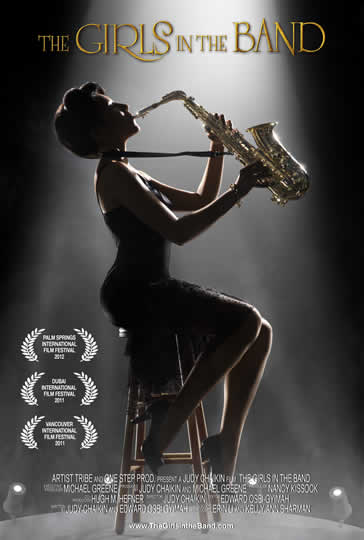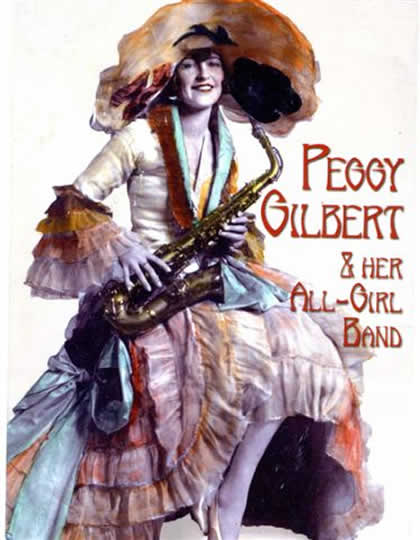 The Girls InThe Band tells the poignant, untold stories of female jazz and big band instrumentalists and their fascinating, groundbreaking journeys from the late 20’s to the present day. These incredibly talented women endured sexism, racism and diminished opportunities for decades, yet continue today to persevere, inspire and elevate their talents in a field that seldom welcomed them.
The Girls InThe Band tells the poignant, untold stories of female jazz and big band instrumentalists and their fascinating, groundbreaking journeys from the late 20’s to the present day. These incredibly talented women endured sexism, racism and diminished opportunities for decades, yet continue today to persevere, inspire and elevate their talents in a field that seldom welcomed them.
Judy Chaikin director of The Girls InThe Band is a graduate of AFI’s Directing Workshop for Women and is best known for writing, producing and directing the Emmy nominated PBS documentary, LEGACY OF THE HOLLYWOOD BLACKLIST. In 2004 she received her second Emmy nomination for the documentary BUILDING ON A DREAM and directed and co-wrote the short romantic-comedy film, COTILLION ‘65, which has appeared in 40 film festivals winning Best Short, Best Comedy, Best Director and Audience Choice Awards. Ms. Chaikin was a Supervising Producer/Segment Director on the ABC series, FBI: THE UNTOLD STORIES, a Co-Producer of the CBS Movie Of The Week, STOLEN INNOCENCE, the Writer/Director of the bi-lingual PBS documentary, LOS PASTORES and was named Best New Music Video Director by Billboard Magazine in 1991. In 1996 Ms. Chaikin won the Blue Ribbon at the American Educational Film and TV Festival for the docu-drama, SOJOURNER TRUTH: AIN’T I A WOMAN, featuring Julie Harris.
Bijan Tehrani: How did you come up with the idea of making The Girls InThe Band?
Judy Chaikin: I was a trumpet player in my Junior High School Band and was discouraged from going any further by the cruel treatment I got from the boys in the band. Then a few years ago a friend of mine told me she had met a woman in her 90’s who said she had been a big band drummer in the 1940’s. I didn’t believe her since I had never seen a woman in a big band except for the singers. So I began to do some research and what I learned amazed me and led to the film you see today.
BT: How much time did you spend on studying the subject and doing research for it?
JC: Six years from beginning to completion of the film
BT: Did you have a detailed story outline or was The Girls InThe Band mainly shaped in the editing room?
JC: I always had the story in my head. We edited the film in a couple of different ways before we hit on the correct form. Then I wrote out a three act outline and that was the blueprint for the overall shape of the film. But the way each act was fleshed out was definitely in the editing room.
BT: How challenging was making The Girls InThe Band?
JC: It was the most difficult challenge I have ever taken on. The women in the film were a joy to work with but the difficult part was the raising of the funds. At first we had incredible financial support, but when the crash hit in 2008 all funding suddenly dried up. The final three years have been excruciating. Especially since the cost of film clips and music rights have soared out of proportion.
BT: What has been the reaction of the artist portrayed in The Girls InThe Band, after watching the completed film?
JC: The artists who appear in the film have expressed enormous gratitude for having their stories told at last. The only unhappy ones are those who got left on the cutting room floor.
BT: What has the reaction been with your audiences? Have they met your expectations? Any surprises?
JC: We have been overwhelmed by the audience response. It has gone way beyond our expectations. The greatest surprise is how people of all ages relate to the film and how many people all around the world have become fans of the film even before it’s been shown.
BT: Any future projects?
JC: Yes, we are working on a feature film based on the documentary.
BT: I understand Hugh Hefner has been a great supporter of The Girls InThe Band, how did he become involved?
JC: I was on the Board of Directors of the IDA when Sandra Ruch was the Executive Director. She knew that I was trying to raise money for the film. She recommended that I get in touch with the Hugh Hefner Foundation. I had already received a matching grant from the Herb Alpert Foundation so I sent Hugh Hefner a seven minute demo of the film and asked if he would match the Alpert grant. Hefner has always been a major supporter of Jazz, so he not only matched the Alpert grant but doubled it. He has subsequently given us additional financial support and hosted a fundraiser at the Playboy Mansion.

